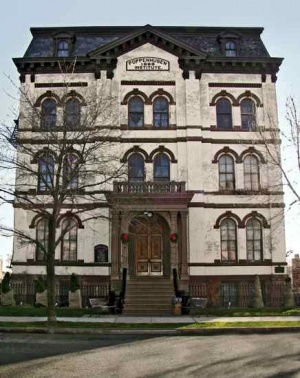Growing up, I heard the story of How-our-Family-got-to-America many times from my cousin Ann Smith. (see Sulzbach Pedigree Chart) If you knew her, you know that exuberance and familial feeling were her strong points; accuracy was not. However, as a kid, I had no reason to doubt her, especially because the story was consistent down to the exact wording. It goes this way: Romermarkt in Frankfurt am Main
Romermarkt in Frankfurt am Main
 Romermarkt in Frankfurt am Main
Romermarkt in Frankfurt am MainPop Jake's father was a teacher, a musician, and a dreamer, who had no head for business. Pop Jake's mother came from a wealthy family, and her father had been a burgermeister of Frankfurt, where Pop Jake was born. (A burgermeister is the equivalent of mayor). Pop Jake's father lost all his wife's considerable money on bad investments. When she found out, Pop Jake's mother was very mad, and so was her whole burgermeister family. She told Pop Jake's father that she never wanted to see him again.
At the same time, Pop Jake was about to be drafted into the military. To avoid the draft, he lied about his age. Then he, his father, and a priest named Father Huber all came together from Germany to America to found the town of College Point, Long Island. His brother Adam remained in Germany and became a monsignor in the Church.
Pop Jake's father was also at one time the President of the Board of Education of New York City. Pop Jake later owned a silk ribbon factory in College Point.
Additionally, my grandmother's family, the Zoellers, were cabinet makers from the South who lost all their money in the Civil War. When that happened, they moved to College Point and opened a boarding house. Pop Jake and his father lived at their boarding house, and that's how my grandparents met. Ann had an ornate mahogany-and-marble dining room set in her house that Theodore Zoeller made.
When my parents married, my father found out that his name was not Albert Jacob Sulzbach as he had called himself his whole life, but Jacob Albert, same as Pop Jake. The priest even signed the marriage certificate stating that he had known my father as Albert for more than 20 years. The explanation, Ann said, was that Pop Jake wanted a son named after him and Grandma did not. Grandma couldn't speak English, so Pop Jake directed the priest to baptize the child Jacob Albert and just never told his wife.
When I found my long-lost cousin, Jacob Sulzbach of Louisiana, he said that his father heard from his father that Chancellor Otto von Bismarck was a terrible person who ruined all Germany and caused World War I. Onkel Adam was not a monsignor, but a Catholic scholar. Pop Jake was from Mainz, and his name was Jacob John. Cousin Jacob knew that because his father was named Jacob John for him. Their side of the family never heard the story of the teacher/musician/dreamer with the mad burgermeister wife.
Well, these stories have a lot of facts, so as a teenager I set about proving them. Grandma Arabella turned out to be born in Manhattan, not the South or Germany. Certainly she could speak English. (I apologize, Grandma.) Maybe the story really went, Grandma couldn't speak Latin so Pop Jake directed the priest to baptize the child Jacob Albert and never told his wife. Then I learned that College Point was actually settled in 1645 and named after a college built in 1838, and the "founder" was Conrad Poppenhusen in the 1850s. No mention of Father Huber or Mr. Sulzbach anywhere.
Poppenhusen Institute, College Point
The passenger lists show that Pop Jake and his father, who I learned was also named Jacob, arrived 8 years apart. Jacob Sr arrived when his son was 10. Eight years later, Pop Jake told the immigration officers he was 19. At 19, wouldn't you still have to join the army? Both Jacobs traveled alone, no Father Huber. I threw everything Ann said out the window and stopped looking for lists of presidents of the Board of Education.
But the moral is, throwing out these family stories is just as bad an idea as believing them wholesale.
Pop Jake and his father did live together in the Zoeller boarding house in College Point in 1880, which did list Mr. Sulzbach as a teacher and Pop Jake as a silk factory worker.



Father Huber's Grave
But Mr. Sulzbach was only mentioned in passing as an early Sunday School teacher. After Pop Jake married Grandma Arabella, Jacob Sr. lived with them, still calling himself a schoolteacher, and died of tuberculosis in his 70s, collapsing on the floor of their kitchen.
I was able to trace the Zoellers back to their arrival in 1845. The whole time they lived in New York. Theodore was indeed a cabinet maker, in Manhattan, until 1868, according to censuses and city directories. In 1870 they show up in College Point with a boarding house, no more furniture making. They could have lost money in the Civil War without living in the South. Maybe they invested in the Confederacy or war industries or maybe the demand for ornate furniture dropped after the war. At an antique show, I saw a sideboard just like Ann's. It dated from the mid-1800s. It is very likely that this dining room set, and who knows what other furniture, was passed down from Theodore to his daughter Arabella, then to her daughter Angie, and then her daughter Ann.
When my sister Renee moved, she gave me some family heirlooms. There was a book with a gold embossed title, Acts passed by the Legislature of this State, relative to the City of New-York, 1860, T. Zoeller. It came with handwritten papers that appear to be ledgers of some kind. The book was falling to pieces, so Renee removed the cover and framed it along with the papers. She didn't know what it all meant, but Theodore was obviously immensely proud of it. The ledgers list names, dates, grades, and money. They are divided up into 3 sections, each with the address of a school. Could they be lists of teachers and their salaries? Wouldn't that be just what a president of the Board of Education would have?
It looked like Ann had the wrong great-grandfather. It was Theodore Zoeller the cabinet-maker, not Jacob Sulzbach the teacher, who was on the School Board. What sense did that make? But now I had a date, 1860. I researched New York City elected officials, and I found that none other than Theodore Zoeller was a trustee for the Board of Education in 1860 and 1861, representing the 17th Ward, where he lived. Not the president, not the entire city. But still very important. A trustee's job, I learned, was not educational policy but money management. Hence the list of salaries. Perfect for a businessman. And the 17th Ward was the main neighborhood for immigrants, growing exponentially. In the 2 years he was a trustee, he built, bought, or rented 3 new school buildings, doubling the number of schools in the Ward.
Did Pop Jake lie about his age to avoid a draft? Did the militaristic Bismarck institute a draft, and what might the age be? Was he really 19 on the ship, or 21 like he told the census taker? More likely to claim you are 21 when you're not, as the age of majority, I think. Pop Jake and Arabella were the same age, but they couldn't have been born in 1861 like Pop Jake claimed, since Arabella was in the 1860 census. We found a birth record for him, definitely 1861. Arabella was the liar - a woman would never admit to being older than her husband.
My long-lost cousin Jacob knew that Jacob Sr. had come to America in 1871, the same year that the German staaten consolidated under one government run by Otto von Bismarck. Bismarck didn't trust Catholics and proceeded to close every Catholic school. Jacob Sr. was out of a job - just the time when you would take a look at your investments. There was no possibility of getting another job in the same field, at least in Germany, making America an attractive possibility. We learned that the Sulzbach family came from Rockenberg, 50 km north of Frankfurt, although Pop Jake was born in Bretzenheim outside Mainz, where there was a Catholic college. Rockenberg is a small town, but it is very proud of its long history. My reading of German history books is not that good, but I think I see a list of burgermeisters, and one of them is named Kramer, Mrs. Sulzbach's maiden name.
What neither of us bargained for was when Jacob Sr. left his family. I thought they were all grown, and Cousin Jacob always wondered why his wife didn't come. In reality, there were 7 children aged 15 down to 2. That was never part of the my-money-hungry-wife-kicked-me-out story. Did he think he could recoup his losses in America? Did he send money home? What is her side of the story? They must have been on good enough terms for Pop Jake to come over once he grew up, yet none of his siblings did.
As for my father Albert, calling people by their middle names was quite common back then. It was actually customary for Germans. I challenged my new cousin to prove Pop Jake's middle name. Neither one of us has been able to --- we can't even find a middle initial. I revised my thinking - Pop Jake was just Jacob Sulzbach.
Here is the incredible part:
Completely out of the blue, my mother got a phone call from a man in Germany, in Rockenberg. He called her because she was the only Sulzbach in the New York phone book, and he was looking for descendants of a Jacob Sulzbach who had come to America 130 years before. This man was a musician, a teacher, and a dreamer -- he had founded a choir called Concordia 150 years ago. The man on the phone was in charge of its anniversary celebration, and he thought it would be great if he could find a descendant. Yes, my mother knew a Jacob Sulzbach, he was her grandfather-in-law. And yes, it must be the same one, because he was also a teacher, a musician, and a dreamer.
Is The Legend True? Chart
References and Suggested Links:
Haas, James E. St. Fidelis Parish, a History. Gateway Press, 2008.
1857, 1859 New York City Directories, Ancestry.com
Poppenhusen Institute — Built in 1868 by Conrad Poppenhusen, the founder of College Point. The architecture features a French Second Empire Mansard roof topping off the three Italianate style stories and was originally the town hall, Poppenhusen selected College Point in 1854 as the site for a factory making hard rubber products and quickly converted the area's farm fields into a thriving community. He donated land for a school and a church, built houses for his workers and provided vocational training and a free kindergarten at the Poppenhusen Institute. Now a federal and state landmark, the building at 114-04 14th Road is still a thriving center. [34]







Comments
Post a Comment